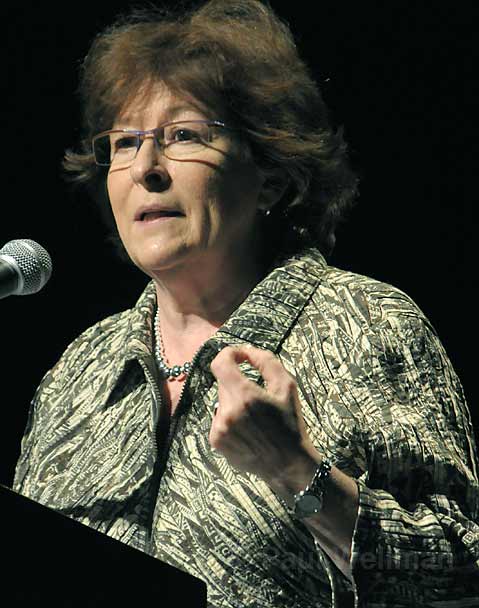Louise Arbour at UCSB’s Campbell Hall
Former UN Human Rights Commissioner Discusses the International Criminal Justice System
Louise Arbour, retired chief prosecutor of the United Nations International Criminal Tribunals for Rwanda and the former Yugoslavia, walked onstage at UCSB’s Campbell Hall in casual slacks and a blouse, hair slightly disheveled. If you ran into her in the supermarket, your first guess would probably not be that she has done more in the past 15 years to advance the cause of international criminal justice than any other single person has since the establishment of the Nuremburg Principles at the end of WWII.
Arbour’s prosecutorial work for the United Nations took place in the 1990s, prior to which she served as a Canadian Supreme Court justice. In 2008, Arbour completed a four-year stint as the UN High Commissioner for Human Rights. “When she came to The Hague, the jail was empty,” said an activist with Human Rights Watch, whose Santa Barbara chapter cosponsored her appearance. “When she left, it was full.”

Arbour began her talk last Sunday by announcing that she wanted to bring clarity to the “tedious and repetitive debate about the tension between justice and peace.” She offered two separate models for international criminal justice systems. The first, to which she said the UN currently subscribes, prioritizes peace over justice: “If war ends, so the logic goes, so will war crimes.” This approach, she said, places war crimes prosecution “in the tool box of peace negotiators.”
The model she favors is an independent war crimes judiciary. “A firewall between prosecutors and the Security Council is needed,” Arbour declared. This carries its own set of problems, she readily admitted, one of which is the danger of retaliation, such as what happened in Darfur, against people who accuse leaders of war crimes. Arbour’s defense was that the people in such instances are already being victimized. “The worst we could do is to cower away,” she said, “and consider [the Darfur indictments] misguided because [they] contributed to suffering of people who in any case were already suffering.”
To minimize civilian casualties and maximize successful indictments, prosecutors should exercise discretion in the timing of indictments, Arbour said, though this increases the risk that they will become political players. They would have to work with strict parameters and oversight mechanisms. But unlike politicians, prosecutors “would not contemplate not doing it,” she said. “I wonder who the Darfur victims would prefer to have speaking for them in peace talks.”
One hundred and twenty nations are members of the International Criminal Court; Arbour said that for the U.S. to join their ranks would be the most significant gesture possible to move international justice forward.



